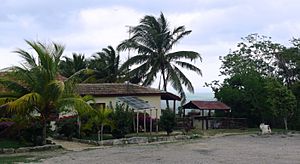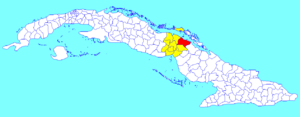Bolivia, Cuba facts for kids
Quick facts for kids
Bolivia
|
|
|---|---|

Ecotourism station in Loma de Cunagua reserve
|
|

Bolivia municipality (red) within
Ciego de Ávila Province (yellow) and Cuba |
|
| Country | Cuba |
| Province | Ciego de Ávila |
| Area | |
| • Total | 918 km2 (354 sq mi) |
| Elevation | 10 m (30 ft) |
| Population
(2022)
|
|
| • Total | 15,055 |
| • Density | 16.400/km2 (42.475/sq mi) |
| Time zone | UTC-5 (EST) |
| Area code(s) | +53-43 |
Bolivia is a town and a municipality in the Ciego de Ávila Province of Cuba. It is located in the northeastern part of the province. This area borders the beautiful Bay of Jiguey and is close to Cayo Romano, an island known for its natural beauty.
Contents
Where is Bolivia, Cuba?
Bolivia is found in the northern part of the Ciego de Ávila Province. This province is in the central region of Cuba. The municipality of Bolivia stretches out to the coast, touching the waters of the Bay of Jiguey. This bay is part of the larger Atlantic Ocean.
Coastal Location and Nearby Islands
Being on the coast means Bolivia has access to lovely beaches and marine life. The nearby Cayo Romano is one of Cuba's largest islands. It is part of a group of islands called the Jardines del Rey (Gardens of the King). These islands are famous for their clear waters and coral reefs.
How Many People Live There?
In 2022, the municipality of Bolivia had a population of 15,055 people. This number tells us how many residents call Bolivia home.
Understanding Population Density
The total area of Bolivia is about 918 square kilometers (354 square miles). To understand how crowded an area is, we look at its population density. For Bolivia, this means there are about 16 people living in each square kilometer. This shows it is not a very crowded place.
Nature and Ecotourism
Bolivia and its surrounding areas are known for their natural beauty. The region has important ecosystems, including coastal areas and reserves.
Loma de Cunagua Reserve
One special place is the Loma de Cunagua reserve. This area is important for ecotourism. Ecotourism means traveling to natural areas in a way that protects the environment. It also helps local people. The reserve likely has unique plants and animals. Visitors can enjoy nature while learning about conservation.
See also
 In Spanish: Bolivia (Cuba) para niños
In Spanish: Bolivia (Cuba) para niños
 | Toni Morrison |
 | Barack Obama |
 | Martin Luther King Jr. |
 | Ralph Bunche |

